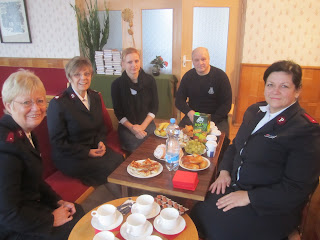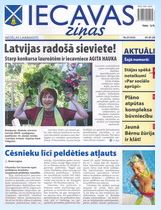Reports about The Salvation Army in the local newspapers in Latvia
Iecava, October 19, “iecavas
ziņas”
Elīna Arāja
Already for 20 years takes care of those who are having hard times
On Saturday, October 6, the international
Christian organisation the Salvation Army (SA) Iecava corps with lots of guests
the 20 year anniversary was celebrated.
In the
solemn event present was also the first leader of the Iecava corps Norwegian
Ruth Hansen who now is leading the SA Bauska corps. The hall was fulfilled with
musical greetings from the Bauska corps choir, tells Karīna Kozlovska, one of
the SA Iecava corps leaders. Among greeters there were also former officers of
the Iecava corps, as well as the leader of local municipality, workers of the
Social Service and others. Heart-warming greeting was given by the SA Regional
Commanders Peter and Rut, but while the small children were blowing soap
bubbles, young people sung a greeting song.
It was then...
The
participants of the celebration remembered the past. The Salvation Army officer
Ruth Hansen arrived in Iecava on one sunny summer day – on August 1, 1992.
Since then she had to live here, serve God and take care of people. At the
beginning meetings took place in the market square, then – in the Iecava
Boarding School, but already for many years the permanent residential place for
Iecava corps is a house on Rigas street 23.
The
Salvation Army started its work in Latvia already in 1923 during the time of
independent Latvia. During the soviet times it was working in secret, but then
the revival started it was officially restored.
New leaders
It is
common in the Salvation Army to have a rotation of corps leaders. In this year
of anniversary since July 26 the leaders of the Iecava corps are two young
women from Riga: Lieutenant Liene Lazdiņa is responsible for communication with
adults and Lieutenant Karīna Kozlovska takes care of children and youth. After
two-year training this summer they were commissioned as lieutenants and
appointed to lead a corps.
Camps for children
Karīna is
working in Iecava on full time since August 1 because in July she was leading a
children camp in Ainaži. These camps are big support for children from poor and
socially marginalised families. “For them it is an opportunity to get out of
the harsh daily reality and to see that there is something lighter in the
world,” says Karīna. All the camps are organized for children at the age from
four up to 18 years, even though sometimes whole families participate in them. In
Ainaži camp there were children that saw the sea for the first time in their
lives, so they all went swimming several times per day. In order for children
to be interesting in camps, every time there is a topic chosen for the camp.
The topic of last summer camp “Spiegu bērni” (“Spy Kids”) was especially
exciting for the participants.
For two years Karīna has
worked as a volunteer in various SA camps in America, but already when she was
a teenager she had been leading different Christian camps.
The camp fee for the
Salvation Army camps for poor children is covered by the donators, but mostly
the money is received by the SA leadership from Sweden. In Latvia it is not
easy to collect in donations the needed amount of money.
Help to the local people
Salvation
Army mainly works with socially marginalised people, which is also shown in its
motto: soup, soap, salvation. One of its main tasks is to feed those who don’t
really have anything to eat. The SA has joined the Ziedot.lv project “Silta
maltīte” (“Warm Meal”), where they receive goods from shop chain Rimi. Such a support will be available
also next year. Big support to the soup kitchen is also the AS “Balticovo”
which gives them eggs.
Soup can be
received in the first floor of the building. Some time ago only around ten
people came to the soup kitchen, but now the number has increased a lot –
during the winter time up to 100 people daily receive warm meal.
Lūcija
Muceniece has helped a lot to the soup kitchen, but the biggest suppliers of
vegetables have been both Vineta and Pāvels Muduri, and Vilnis and Laima
Kalderauski; significant support is provided also by the municipality. The
budget for the soup kitchen for this year is 6000 LVL, from which till the
September 30 have been used 59.7%.
The cook of
the Iecava corps Lilita Lazdiņa who works there already for many years is much
appreciated there. “Practically Lilita is the main person here. She works to
her full potential, and she always tries to help,” admits Karīna.
Soup is
made every day: three times a week everyone can come to the soup kitchen, but
two days are left for people invited by workers of the Social Service. To those
people who can’t come to the soup kitchen, Salvation Army workers deliver soup
to their homes, even as far as to Zālīte.
The SA
closely cooperates with the Social Service in order to find out about the
people that need the help the most. In the day care centre it possible also to
wash in a shower and to use a washing machine. Also the SA in Iecava offers to
learn common English for free, as well as to participate in aerobics. Once a
week children (7-12 years) and youth (13+ years) take place, but every Sunday
there are worship meetings. “It is not like that that everyone who comes to
activities also comes to meetings,” says Karīna, emphasising that everyone can
participate in activities without any liabilities. It is interesting that
Karīna also is teaching Middle Age sword-fighting. In order to do that, she has
received a certificate. If anyone would be interested, she can also teach first
steps in self-defence.
Nice event
every week is a Home League when people can come together, discuss, obtain new
knowledge in house-holding and do them practically, because there are people
who don’t know how to do the most simple things.
“Everyone
is welcome to participate in these activities; we will try to help to everyone.
But people can just come and unburden themselves,” says Karīna. She also
invites to bring clothes to the Iecava corps that could be given to the needy.
































